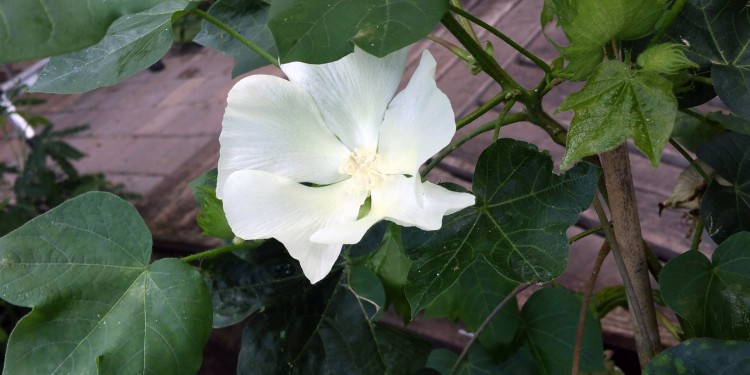
Children’s workshops beat the drum for more sustainability
Flowers and plants not only look beautiful – they can also carry a message. The project entitled “The Political Plant”, in which has Münster University’s Botanical Garden is involved as a project partner, aims to promote biodiversity and sustainability by means of educational and transfer activities. The workshop programme “Very attractive – what fibre plants can do!” is designed to enable children of primary school age to get to know various fibre plants such as cotton, hemp, linen, jute and nettles.
“The idea of our programme is to raise children’s awareness of the range of different plant fibres that exist, and where their clothes come from,” explains Dr. Mirja Hentschel, who is responsible at the Botanical Garden for public relations and the coordination of guided tours. The workshops will be held at the Q.UNI Camp in the summer holiday, between June 27 and August 15. During the 90-minute event, children in the childcare programme can learn how fibre plants are grown, how the fibre is obtained and how items of clothing are produced. “We want to motivate children to think about subjects such as biodiversity and sustainability,” says Hentschel.
At a national level, those involved in the joint project “The Political Plant” are the Association of Botanical Gardens (Verband Botanischer Gärten e. V.), the National Association of State-Sponsored Educational Centres for Nature Conservation and Environmental Protection (Bundesweiter Arbeitskreis der staatlich getragenen Bildungsstätten im Natur- und Umweltschutz) and the University of Kassel. Besides the Botanical Garden at the University of Münster, a further ten Botanical Gardens and eight Nature Conservation Academies in nine of Germany’s regional states are also involved in the project. The German Federal Environmental Foundation (Deutsche Bundesstiftung Umwelt) is funding the three-year project, which is set to run until the end of 2021.
Working together in teams based in the regional states, the project partners aim to develop events in a variety of formats, as well as educational activities, which serve to strengthen not only the idea of sustainability, but also increase the willingness of members of the public to become involved in environmental and political matters. “Of course, we don’t believe in any possible awareness, intentions or political action on the part of plants,” says Hentschel, commenting on the name “The Political Plant”. “But the wordmark is an example of how ecosystems, and wild and cultivated plants, are all objects of political considerations, conflicts and legislation.”
After their experiences with the Q.UNI Camp, the Botanical Garden team plans to develop and adapt the workshop programme for schoolchildren from classes 5 to 7. Aspects which are to be included are, for example, fair trade, poor working conditions in countries where the plants are grown, and the high level of water needed for cotton plantations. “Sustainability will play a greater role in the educational activities we offer in future,” says Hentschel. “We want to attract adults too – for example, in the form of discussions.”
